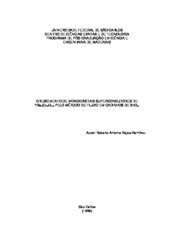Crescimento de monocristais supercondutores de YBa2Cu3O7-ȣ pelo método de fluxo em cadinhos de SnO2.
Abstract
Nowadays, the flux method is one of the most widely used techniques promote growth of YBa2Cu3O7-ȣ single crystal superconductor. By using the material in a melted state, the reactions due to temperature are possible. To prepare single crystal superconductors of the family Y-Ba-Cu-O, a long period of time is necessary to melt the material in adequate conditions. In order to do this a satisfactory performance of the crucible is required; it must be resistant to any kind of chemical attack. In this work some materials used were investigated in crucibles. Platinum, gold (noble metals), oxides like Al2O3, ZrO2 showed problems when used in processing Y123 superconductors. To avoid this problem the zirconiaytria system is largely applied. Some authors have investigated the SnO2 crucible, but they found problems related to the densification of the SnO2. Recently, it was discovered that SnO2 can be densified without liquid phase, showing 99,7% of the theoretical density when sinterized up to 1300°C. Then, this condition was used to produce crucibles by slip casting to form the YBa2Cu3O7-ȣ single crystal superconductors without contamination. It was observed, in a first instance, that SnO2 crucibles are resistant to chemical attack of the flux that is rich in barium and copper. During the process it was observed an interface wall between the vial and the flux formed by BaSnO3. This protection is formed after heat treatment at 1025°C during 4, 17 and 24 hours. By increasing the treatment time (up to 24 hours), it was observed that the wall thickness increased too and it was possible stablish a relation between treatment time/thickness wall (that defines the resistance of chemical attack). This enabled the determination of the SnO2 crucible resistance to corrosion, under the flux condition. The second part of this work involved the Y123 single crystal growth. After produced, they were analysed by x-ray diffraction and SEM with microanalysis in cross sections of the crucibles to observe the BaSnO3 interface. It was observed that single crystals were not contaminated by tin, and they were analyzed through measuring magnetization vs. Temperature. The single crystal showed a critical temperature (Tc) around 90,5K with a transition width (Tc) around 19,5K before treatment with an oxygen flux at 450°C. After seven days of a second treatment under the same conditions, the Tc was increased to 92K with a decreasing to 4,5K in Tc. The results showed that SnO2 vials are resistant to BaO-CuO flux and appropriate to single crystal growth in YBa2Cu3O7-ȣ superconductors without external.
